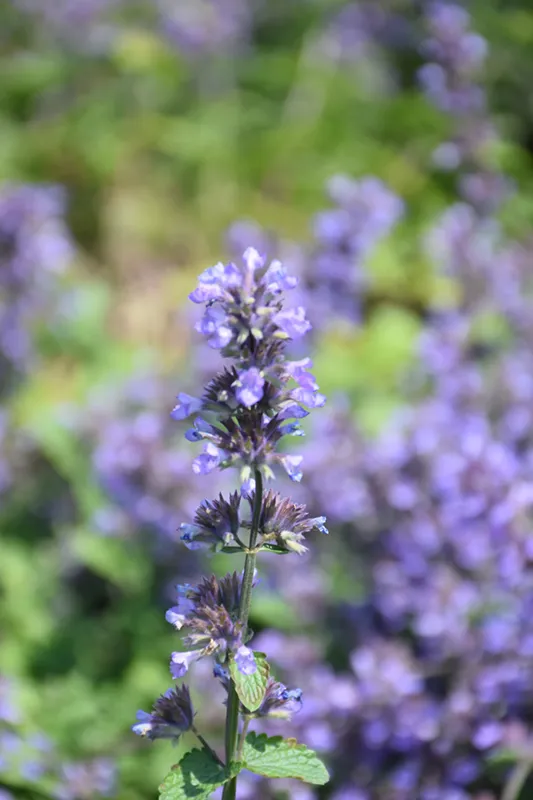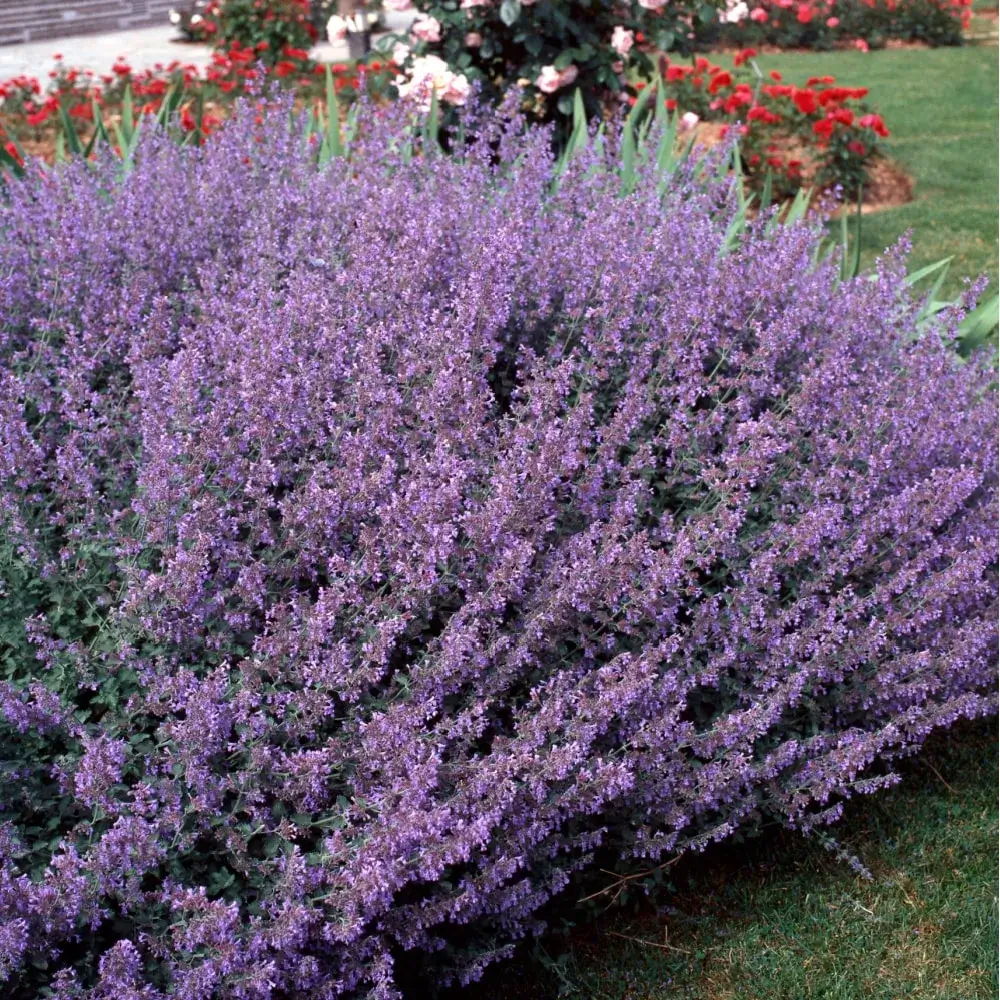Family: Catmint
Type: Perennial

Cat’s Pajamas Catmint, known botanically as Nepeta ‘Cat’s Pajamas’, is a delightful perennial that offers both ornamental and aromatic qualities. It’s celebrated for its dense lavender-blue flowers and compact growth habit.
This variety is a standout in the Nepeta family, blooming earlier and longer than many others. Its flowers appear on the stem from the base upward, providing a long season of color.
Adaptable and easy to grow, Cat’s Pajamas Catmint thrives in full sun to partial shade and is hardy in zones 3-8. It’s a fantastic choice for gardeners seeking a low-maintenance yet high-impact plant.
Hardiness Zone: 3a-4a
Deer Resistant: Yes
Pet Friendly: Yes
Moisture Preference: Dry to moist
Sun Needs: Full sun to partial shade
Growth Rate: Fast
Average Height (feet): 1
Average Spread (feet): 2
Average Life Span (years): 10
Form: Mounded
Flower Color: Purple
Secondary Flower Color: Blue
Bloom Season: From late spring to mid summer
Foliage Color: Green
Foliage Shape: Pointy
Integrating Cat’s Pajamas Catmint into your garden design can add a burst of color and a delightful fragrance. It’s ideal for borders, herb gardens, or as a fragrant addition to walkways and patios.
This plant is perfect for pollinator gardens as it attracts bees, butterflies, and hummingbirds. It’s also deer and rabbit resistant, making it a great choice for areas with wildlife.
Despite its showy appearance, Cat’s Pajamas Catmint requires minimal care. It’s drought-tolerant once established and does not require much watering or fertilizing.

In a cottage garden, Cat's Pajamas Catmint adds charm with its informal look and long-lasting blooms.
For rock gardens, its compact size and tolerance for dry conditions make it an ideal fit among stones and gravel.
In container gardens, it's a great choice for adding height and color, and its fragrance can be enjoyed up close.
Plant along pathways or borders for a beautiful and fragrant edge. Its blooms and scent enhance the sensory experience of the garden.
Use in a moon garden. Its light-colored flowers are visible in the evening, and its fragrance intensifies at night.
Combine with other perennials like lavender and salvia for a stunning display of color and varied textures.
Select our pre-made garden layouts to create a landscape that’s uniquely yours. Simple, smart, and customizable!
In spring, Cat's Pajamas Catmint begins to grow, setting the stage for early summer blooms.
During summer, it displays abundant lavender-blue flowers, providing a long-lasting and vibrant show.
In the fall, the plant may continue to bloom until the first frost, offering extended color in the garden.
In winter, Cat's Pajamas Catmint dies back. In milder climates, some foliage may remain, providing winter interest.
Cat’s Pajamas Catmint should be planted in areas with full sun to partial shade. It’s perfect for open landscapes, sunny borders, or herb gardens.
This plant thrives in full sun but can tolerate partial shade, where it will still bloom but may not be as vigorous.
Cat's Pajamas Catmint prefers well-draining soil and is adaptable to various soil types, from sandy to clay.
Space plants about 18 inches apart to allow for their mature spread and ensure adequate air circulation.
The best time to plant Cat’s Pajamas Catmint is in the spring or early fall, allowing the plant to establish itself before extreme temperatures.
Dig a hole slightly larger than the root ball. Place the plant in the hole, fill it with soil, and water thoroughly. Ensure it’s at the same depth as it was in the container.
Water regularly after planting until established. Once established, Cat’s Pajamas Catmint is drought-tolerant and requires minimal watering.
Fertilize lightly in the spring, if at all. Over-fertilizing can lead to leggy growth.
Prune back in early spring to promote bushier growth and more blooms. Deadheading spent flowers can encourage a second bloom.
Remove any dead foliage and apply a thin layer of compost to encourage growth.
Water during prolonged dry spells. Deadhead regularly to prolong blooming.
Reduce watering and prepare the plant for winter dormancy.
Cut back the foliage after the first frost or leave it for winter interest and cut back in early spring.
Cat’s Pajamas Catmint blooms from early summer to fall, especially if deadheaded regularly.
Yes, it is generally resistant to deer and rabbits, making it a good choice for gardens with wildlife.
While not typically used in cooking, catmint can be used in similar ways to mint in teas and as an herb.
Sign up below to get exclusive deals, discounts, and new plant collections—delivered straight to your inbox! Plus, stay inspired with the latest gardening tips, landscaping trends, and DIY garden ideas. Start growing with us today!
A big thank you for subscribing to the PBN Design newsletter.
We're thrilled to have you join our community. Get ready for exciting updates, insightful content, and more delivered straight to your inbox.
Stay tuned!
Go backA big thank you for subscribing to the PBN Design newsletter.
We're thrilled to have you join our community. Get ready for exciting updates, insightful content, and more delivered straight to your inbox.
Stay tuned!
Go back